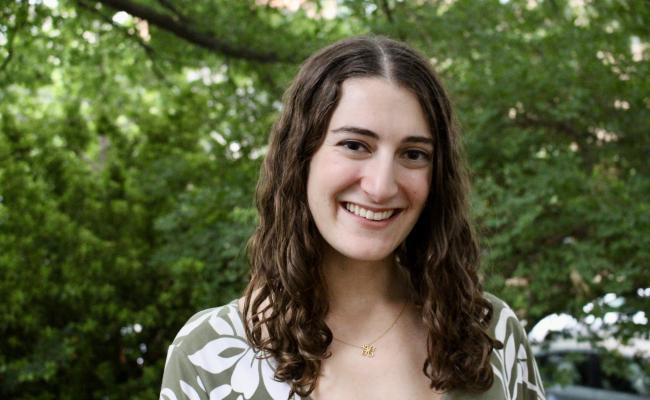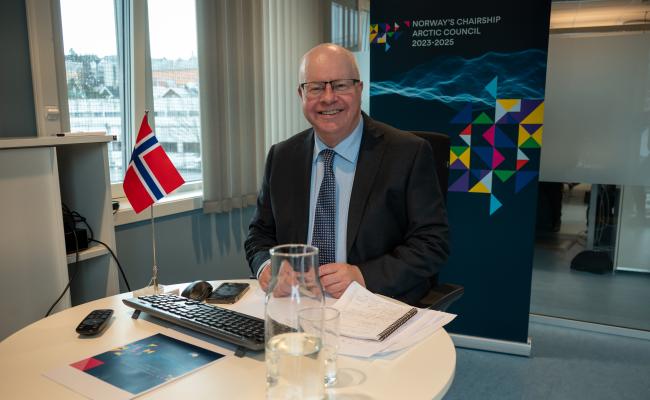The Arctic Circle Assembly 2024 “If We Lose the Arctic Council, It Is Lost Forever”
State secretary for the Norwegian ministry of foreign affairs, Maria Varteressian, was clear when she delivered the message about the Arctic Council's importance for the Arctic from the Arctic Circle Assembly stage. (Photo: Trine Jonassen)
Reykjavik (High North News): As Norway's chairship of the Arctic Council embarks on its final six months, it is time to look back on the road that was forged as they walked, when they were handed a broken council from a Russia at war.
State secretary for the Norwegian ministry for foreign affairs, Maria Varteressian (Labor), made sure she was crystal clear from the Arctic Circle Assembly stage in Reykjavik:
“The Arctic Council is very much alive, and it will continue to be so because it must. If we lose it, we won't get it back. The Arctic Council is at the heart of Arctic cooperation, and it is irreplaceable," the state secretary announced firmly.
And that is precisely what the Norwegian Arctic Council's team has worked tirelessly to do this for the past six months. Not only keeping the council alive, but also keeping it working under extraordinary circumstances.
“But”, Varteressian admits;
“It has not been easy.”
The situation in the Western world flipped
Hot and cold
During the Norwegian chairship of the Arctic Council, it has been in its most challenging state ever due to geopolitics making multilateral relations colder.
After a "golden age" of globalization, multilateralism and democracy on the rise with the development of multilateral cooperation – the Arctic Council is one of them – the situation in the Western world flipped.
When Russia invaded Ukraine in February 2022, it took the other seven members of the Council – quickly named the Arctic 7 - a few weeks to decide that all work had to be put on hold until further notice. Russia held the chairship, and Arctic 7 announced a break on 3 March of the same year.
A year of standstill
There was great anticipation related to how Norway would manage to take over the chairship from Russia without either physical meetings or official talks, after a year in crisis and standstill.
This is something that usually happens in the host country with all Arctic senior officials present, and where a joint declaration is signed that the eight countries have agreed on.

Morten Høglund is chair of the Norwegian chair of the Arctic Council. (Photo: Hogne Bø Pettersen/High North Center)
In May last year, there were no joint meetings and no joint declaration. Russia held the meeting on 11 May 2023 in Salekhard, Russia in an online format with only delegates from the member states and the permanent participants attending.
Ironic
The message from the Chair of the Committee of Senior Officials of the Arctic Council under the Russian Chairmanship, Nikolay Korchunov – now Russia’s ambassador to Norway – was one of dialogue, peace, stability, and international cooperation in the Arctic.
A statement that seems ironic, at best, given the brutality of the Ukraine war.
The way the transfer from Russia to Norway happened, was nevertheless called a “diplomatic masterpiece” by experts.
Under pressure
Over two years into the war and six months into the Norwegian chairship, democracy is under pressure and in decline.
“So is multilateralism trust”, said Maria Varteressian.
Also read (The Article Continues)
“We see great power rivalry, conflict and climate change. Which is the very reason why we need the Arctic Council to stay alive, because climate change does not care about geopolitics or geography.”
No business as usual
And given the current political situation with Russia's illegal, brutal war in Ukraine, it cannot be business as usual.
A statement that was given by several speakers during the Arctic Circle assembly, including the US's first Arctic ambassador, Mike Sfraga.
How did the Norwegian chairship manage to breathe life into the paralyzed organization they took over from Russia?
“Our ambition has been to ensure that it survives. And we've done it through step-by-step steps that started with a written procedure. We then progressed to digital expert level. And as we speak, projects are being developed, work plans are being updated and knowledge and experience are being created and shared.”
“And no, there were no high-level or ministerial meetings,” reassured the state secretary.
It is looking more optimistic than it did two years ago
“But we have managed to ensure that the council lived. None of that would have been possible if the Norwegian chairship worked alone”, Varteressian said, pointing to the other six member states of the Arctic Council, the indigenous organizations and all the observer states.
She also called out Arctic Council Senior Arctic Official, Morten Høglund as someone who has worked tirelessly to make sure that the Arctic Council is in in a position and a state where it is looking more optimistic than it did two years ago.
What’s next?
Regarding the last six months of the Norwegian chairship, Varteressian revealed events that will take place in Northern Norway. But first, the Arctic Council will travel to the 29th annual UN climate conference - COP 29 - in Baku, Azerbaijan in November.
In January, the Council will organize a youth platform with a focus on strengthening young people in the Arctic. This will happen in Tromsø just before the Arctic Frontiers conference.
Finally, the Arctic Council's team will hold a conference in Bodø in March, on Arctic emergency prevention, preparedness and response.
"And most importantly, in May next year we look forward to handing over the chairship to the Kingdom of Denmark to continue the important work of keeping the council alive", state secretary Maria Varteressian finished.
Did it to themselves
The US senator for Alaska, Republican Lisa Murkowski, shared the stage with Sfraga earlier in the day to comment on the current and still tense situation with Russia in the Arctic Council. She emphasized that Russia did this to itself.
"We didn't cut Russia out of the Arctic Council, they did it on their own because of their aggressive provocation and the war they brought to Ukraine. There are consequences. There are sanctions that must go with it, and that means cooperation must in many cases be completely off the table.”
She said that looking away was never an option.
"We just can't turn our heads and say that 'what you're doing is bad over there, but let's continue to work together here'. It compromises our science. I think we recognize that, and it's difficult because we need that combined data and sharing", Murkowski said.
"It just can't be business as usual, that has been our line. It just can't."



